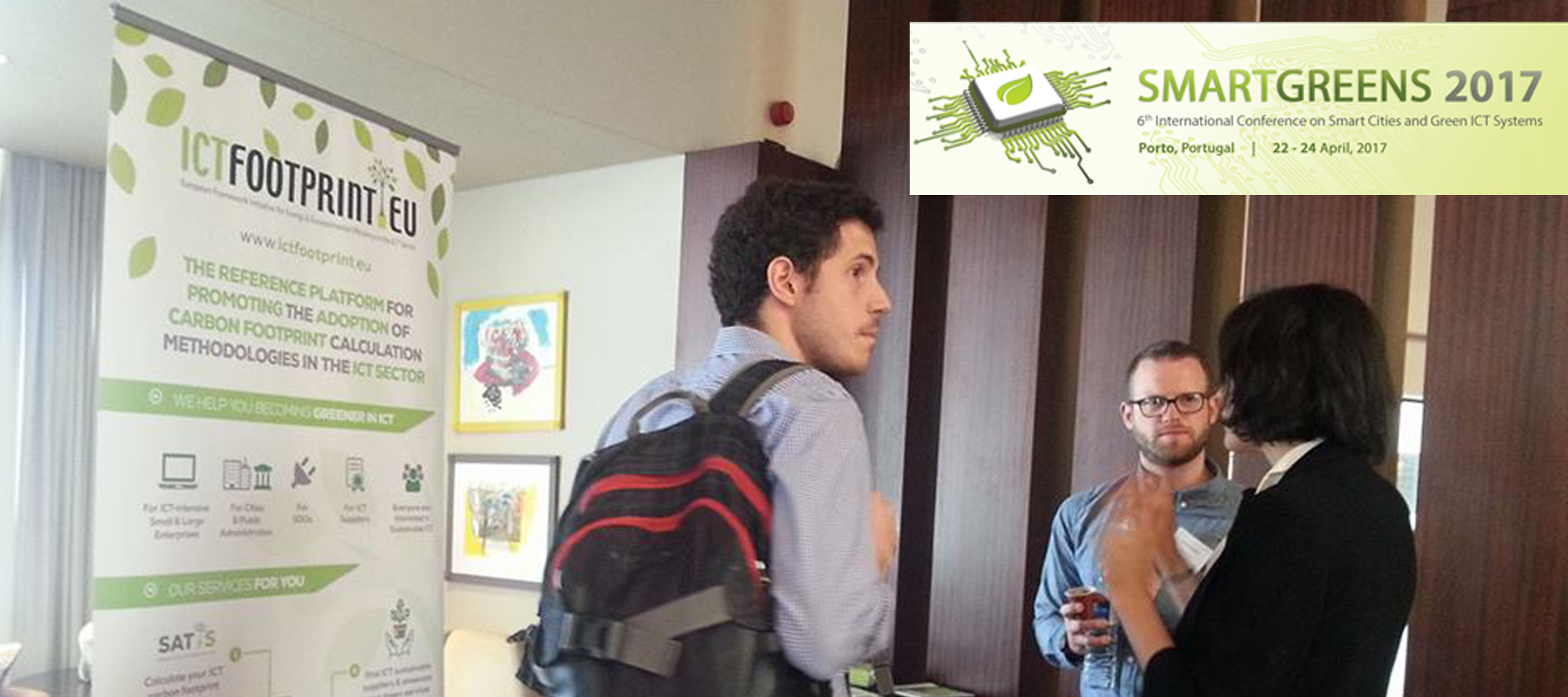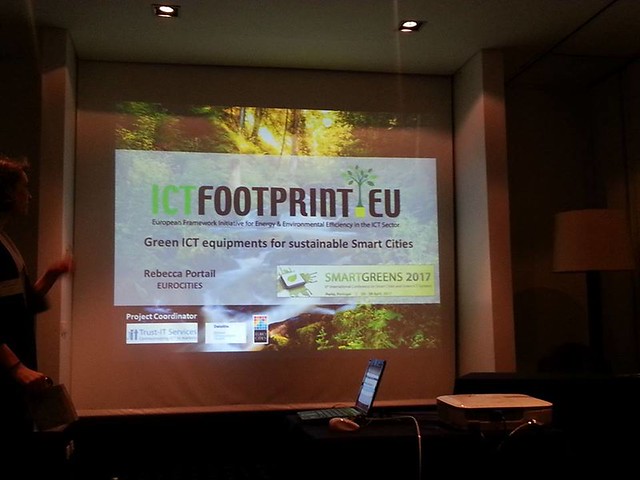
Smart Cities in hands with ICT sustainability: ICTFOOTPRINT.eu at SMARTGREENS
Last week ICTFOOTPRINT.eu attended SMARTGREENS 2017, in Porto, Portugal, a conference that brought together researchers, designers, developers and practitioners interested in the advances and applications in Smart Cities, Green Information and Communication Technologies, Sustainability, Energy Aware Systems and Technologies.
This provided an excellent forum to showcase the project with an exhibition booth, where SMARTGREENS attendees got more detailed information about ICTFOOTPRINT.eu services, represented by Trust-IT Services (project coordinator) and EUROCITIES (project partner).
Smart cities as a key factor in ICT sustainability
A 20 minute presentation on “green insights” was also given explaining how ICTFOOTPRINT.eu services help cities reducing their ICT carbon footprint, by making informed decisions on how to make their ICT services sustainable and energy efficient. The audience was made aware of why “green IT” is important for cities and why they have a key role in making the ICT sector more sustainable. ICT can save up to €600 billion & decrease 15% of carbon emissions in 2020, by becoming energy efficient (The Climate Group). Cities contribute to 70% of the world’s greenhouse gases (GHG), where +50% World Population lives.
Thanks to a low carbon ICT, Malmo city saved over 500.000 € in one year, while Linkoping decreased energy consumption by 30% (80.000 €). In addition, some cities shall implement public procurement favouring green IT procedures, such as Nantes (France), where the city has organised demos of green IT projects, developed a Green Code Lab and a global eco-design certificate for an energy-efficient website, among other examples.
Getting familiar with tools & services for sustainability in ICT sector
Attendees were also made aware of ICTFOOTPRINT.eu tools which have been carefully developed to face the most common reasons why organisations do not become sustainable in ICT: lack of knowledge and expertise, lack of time, and low awareness of the benefits.
The Webinars give training and information to those who do not have expertise and want to make their organisation more sustainable. The free marketplace is the online meeting point to find sustainable ICT suppliers with services and products that help stakeholders achieve lower levels of ICT carbon footprint.
The Self-Assessment Tool for ICT Services, known as SAT-S is a useful, free, quick and easy-to-use tool to calculate the carbon footprint of ICT services, which helps users make informed decisions on how to make their ICT services sustainable and energy efficient. The multilingual online help-desk (English, French, Spanish, Italian & German) gives customised support on sustainable ICT standards.
New audiences to promote energy efficiency in ICT
ICTFOOTPRINT.eu is happy to have showcased the project to new audiences and to find new synergies with different stakeholders, from researchers to Standard Development Organisations, which will support Europe in becoming more sustainable in its ICT.
Download the ICTFOOTPRINT.eu presentation here
Get the ICTFOOTPRINT.eu Flyer customised for Cities & Public Administrators here
Download the ICTFOOTPRINT.eu rollup banner firstly showcased to the public here
See our gallery below





 © 2018 ICTFOOTPRINT.eu – ICTFOOTPRINT.eu has received funding from the European Commission’s Horizon 2020 research and innovation programme under the Grant Agreement no 690911. The content of this website does not represent the opinion of the European Commission, and the European Commission is not responsible for any use that might be made of such content.
© 2018 ICTFOOTPRINT.eu – ICTFOOTPRINT.eu has received funding from the European Commission’s Horizon 2020 research and innovation programme under the Grant Agreement no 690911. The content of this website does not represent the opinion of the European Commission, and the European Commission is not responsible for any use that might be made of such content.